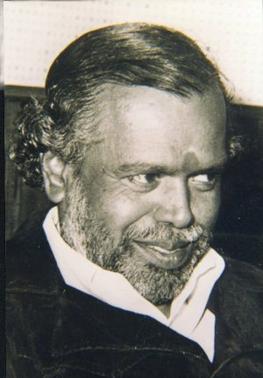
Shubraveshti Ramaswamiah Seetharama Sharma, known popularly as S. R. Puttanna Kanagal, was an Indian filmmaker known for his work in Kannada cinema. He is often considered one of Indian cinema's most influential filmmakers.
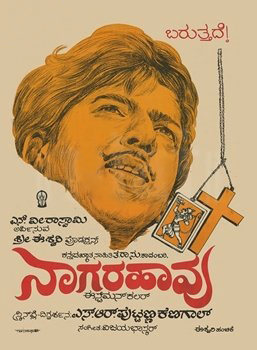
Naagarahaavu (transl. Cobra) is a 1972 Indian Kannada-language film directed by Puttanna Kanagal, based on T. R. Subba Rao's three novels Nagarahavu, Ondu Gandu Eradu Hennu and Sarpa Mathsara, and starring Vishnuvardhan, Aarathi, K. S. Ashwath and Shubha. The supporting cast features Leelavathi, M. Jayashree, M. N. Lakshmi Devi, Ambareesh, Shivaram, Dheerendra Gopal, Lokanath and Vajramuni. The film has a musical score by Vijaya Bhaskar. Cinematography was done by Chittibabu.
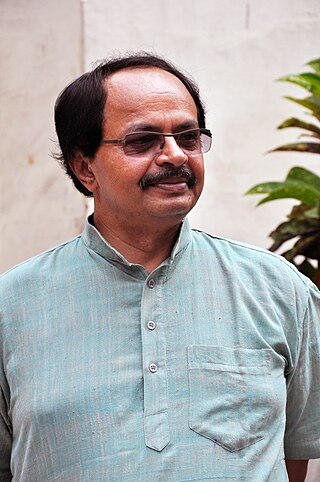
Nagathihalli Chandrashekhar is an Indian director, actor, screenwriter and a lyricist who predominantly works in Kannada Cinema. He made his film debut as a screenplay writer in Kadina Benki (1986) which won the National Film Award for Best Feature Film and the Karnataka State Award. His directorial debut was Undu Hoda Kondu Hoda (1991) for which he won the Karnataka State Film Award for Best Story.

Krishnaveni is a 1974 Indian Telugu-language film directed by V. Madhusudhana Rao, starring Krishnam Raju and Vanisri, under the banner of Gopikrishna Movies. The film met with strong critical reception and commercial success upon release. The movie was about a lady suffering from hysteria and the emotional trauma of her family. The film is a remake of the Kannada hit film Sharapanjara (1971).

Anasuya Shankar, popularly known by her pen name as Triveni, was an Indian writer of modern fiction in Kannada language. Many of her novels have been made into feature films, most prominently, Belli Moda (1967) and Sharapanjara (1971) – both directed by Puttanna Kanagal and featuring actress Kalpana. Her short-stories collection Samasyeya Magu won the Devaraja Bahadur Prize in 1950. Her novel Avala Mane earned the Karnataka Sahitya Academy Award in 1960.

Belli Moda is a 1967 Indian Kannada-language film directed by Puttanna Kanagal in his directorial debut. It was based on the novel of same name by Triveni. Kanagal remade the film in Malayalam in 1967 as Swapnabhoomi and in Telugu in 1968 as Palamanasulu.

Gejje Pooje is a 1969 Indian Kannada-language film directed by Puttanna Kanagal and produced by Rashi Brothers. The film stars Kalpana, Gangadhar and Leelavathi. Actress Aarathi made her first screen appearance in this film. It is based on the novel of the same name by M. K. Indira. The film was remade in Tamil as Thaaliya Salangaiya, in Telugu as Kalyana Mandapam, and in Hindi as Ahista Ahista.
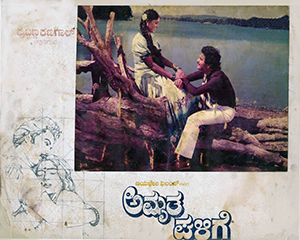
Amrutha Ghalige is a 1984 Indian Kannada-language romantic drama film directed by Puttanna Kanagal, based on the novel Avadaana, by Dodderi Venkatagiri Rao. The film stars Ramakrishna, Padma Vasanthi and Sridhar.

Ranganayaki is a 1981 Indian Kannada language film directed by Puttanna Kanagal starring Aarathi, Ambareesh, Ramakrishna, Ashok, Rajanand. The film is based on the novel of the same name by Ashwattha.
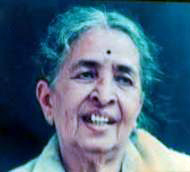
Mandagadde Krishnarao Indira was a well-known Indian novelist in the Kannada language. Her works include Phaniyamma, which won various awards. She began writing novels at the age of forty-five. Some of her novels were made into movies.

Kalpana, born Sharat Lata, was an Indian actress who appeared in Kannada films. She was affectionately referred to as Minugu Taare among the film fraternity. She was widely recognised as one of the greatest actresses of Kannada cinema who enjoyed both fan following and critical acclaim. She made her screen debut as a lead actress in the 1963 release Saaku Magalu directed by veteran B. R. Panthulu. During a career that spanned from the early 1960s to the late 1970s, Kalpana appeared in numerous commercially successful as well as critically appreciated films, many of which featured her alongside actor Rajkumar. She worked in a few Tamil, Tulu and Malayalam films as well. Many of her successful films were female-centric, giving ample scope for her performance.

Anupama Niranjana (1934–1991) was a doctor in India and writer of modern Kannada fiction and non-fiction.
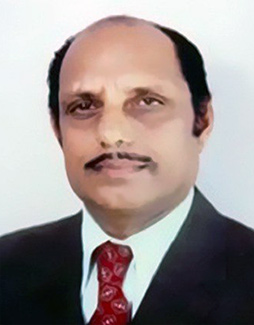
Vijaya Bhaskar was an Indian music director and composer who composed music for several mainstream and experimental feature films in the Kannada film industry. Scoring music for over 720 films, Bhaskar worked in Tamil, Telugu, Malayalam, Marathi, Tulu and Konkani language films as well. He was a part of all films of director KSL Swamy (Ravi) and also shared a great association with acclaimed directors Puttanna Kanagal and Adoor Gopalakrishnan.
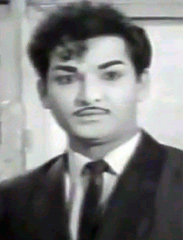
Gangadhar (1936–2003) was an Indian actor known for his work in Kannada cinema. A character actor who transitioned from stage to films in the mid-1960s, he had a brief period of success when his performances in social-dramas such as Gejje Pooje (1969), Sharapanjara (1971) and Seetha (1970) were noted. In addition to the former two, he starred in Katha Sangama (1975) and Ranganayaki (1981), all of which were directed by Puttanna Kanagal. Other films he starred in include Nanna Thamma (1970), Aliya Geleya (1971) and Bhale Adrushtavo Adrushta (1972).
Hoovu Hannu is a 1993 Indian Kannada-language drama film based on the novel by Triveni of the same name. The film stars Lakshmi, Ajay Gundu Rao, Vyjayanthi and Baby Shamili. It was directed by Rajendra Singh Babu and produced by Vaibhava Lakshmi Productions. The music and lyrics were written and composed by Hamsalekha. The film was a musical hit and won many awards including the Karnataka State Film Awards and Filmfare Awards South. Veteran cinematographer V. K. Murthy worked in this film and won many accolades for his work. The film failed at box-office.
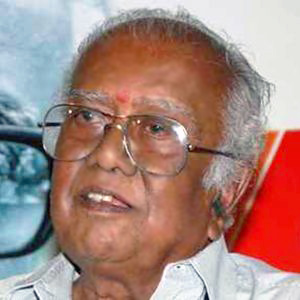
Lakshman Rao Mohite, better known by his pen-name Geethapriya, was an Indian film director and lyricist of the Kannada film industry. He has directed 40 films and penned over 250 songs in Kannada films. In 1992–93, he was awarded the Puttanna Kanagal Award for his contribution to Kannada cinema as a director.
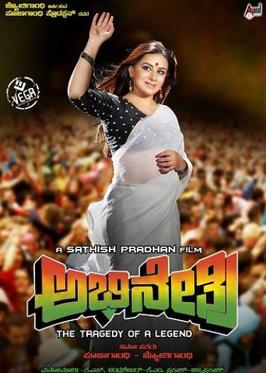
Abhinetri – The Tragedy of a Legend is a 2015 Indian Kannada language film directed by Satish Pradhan. It stars Pooja Gandhi in the lead role. The film is based on the life of actress Kalpana. The supporting cast features Makarand Deshpande, Srinagar Kitty, Atul Kulkarni, P. Ravi Shankar and Neethu. After much delay in the post production, the film opened on screens on 30 January 2015.
Upasane is a 1974 Kannada musical drama film, directed by Puttanna Kanagal. The film produced by Rashi brothers, is based on the novel of the same name, written by Devaki Murthy. The film mostly had women playing the lead roles, consisting of Aarathi, Leelavathi, M. N. Lakshmi Devi, G. V. Sharadha and Advani Lakshmi Devi. Dr. Govinda Mannur, K. S. Ashwath and Seetharam played the male supporting roles. Actor Seetharam was colloquially named as "Upasane" Seetharam for the rest of his career after the release of this film.
Yaava Janmada Maitri is a 1972 Kannada language romantic drama film directed by Geethapriya and starring Gangadhar and Kalpana in the lead roles. The film is a direct screen adaptation of the novel "Jeevana Chaduranga" written by the novelist Ma. Bhi. She. Actress Vaishali Kasaravalli made her debut in this film, opposite comedian Narasimharaju. The film was remade in Telugu in 1973 as Sarada, in Tamil in 1973 as Radha and in Hindi in 1975 as Dulhan.
Dharmasere is a 1979 Indian Kannada-language romance film, based on the novel of the same name by Jada Bharatha. It was adapted into a screenplay by Puttanna Kanagal and produced by actress Aarathi under the banner Sri Amba Films. The film stars Aarathi as Tunga, Srinath as Maadhu and Sathyapriya as Leela. The film tells the story of a mute girl who gets married off to her sister's husband and live the solitary life.
















